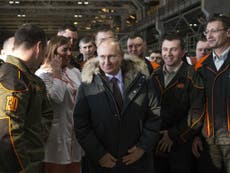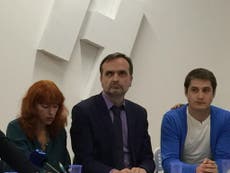It may seem like LGBT rights aren’t important to Putin – but if you look closer, you’ll see they’re central to the Russian election
The stability of Putin's government relies on this discrimination – which is why his propaganda has a particular flavour

A quick search recently for LGBT news on Yandex – the largest Russian search engine – threw up a very depressing list: “Users are outraged by the new LGBT-friendly ad for iPhone”, “Russian actor gets kicked out after supporting LGBT people”, “Berlinale-2018: perverts and russophobes are occupying modern cinema”.
A whole stack of news is dedicated to a new online game called “Play for the President: help Putin kill naked men with a rainbow flag”. The game allows you to become “a former KGB agent” and destroy “enemies of the state”, which “naturally” includes the LGBT community, opposition leader Navalny and US President Donald Trump. It reminds me of another recent game published by a popular Russian news site Lenta.ru, where readers were asked to like photos of celebrities who were “lucky enough” to be “raped and made famous” by Harvey Weinstein.
In other countries such online games might have caused a big backlash from the public and commercial partners, but in Russia for many they seem to serve as yet another reinforcement of a very conservative and disempowering belief system. A system in which women are given flowers but also beaten by their husbands, and where it’s widely believed that the immoral influence of the LGBT community should be immediately mitigated for the sake of the children.
Meanwhile, Russia is heading for presidential elections beginning 18 March. Even though on the surface it may seem that LGBT issues are not on the agenda of any of the candidates, including Putin, if you look closer it feels like their stance on LGBT rights remains central to the stability of the Russian government.
Evidence to this is an allegedly state funded election video, which went live three weeks ago, urging Russians to go out and vote. In the video, viewers are shown an alternative reality in which the newly elected government openly supports LGBT rights and lets black people serve in its forces. The video intends to scare voters who are doubting whether to vote for the current political setup and might support more liberal thinking candidates.
Ksenia Sobchak, the only oppositional candidate to openly support LGBT rights in Russia, called the video homophobic: “To turn LGBT people into a threat in a homophobic country is not a joke. It once again fuels discrimination of the minority”. The reality of such propaganda is indeed horrific.
Last week Amnesty International reported that 106 people who survived the horrific mass persecution of gay men in Chechnya in March-May 2017 were able to escape Russia. But many more of the hundreds suffered and those who are still being threatened remain in hiding or continue to live in their hometowns. Many have protested against the Chechnyan authorities – but to date no visible developments have been made.
Apart from the government’s reluctance to investigate these crimes, another difficulty is that only one person agreed to identify himself and come forward in the Russian investigation. It is not surprising since, as the journalists of Novaya Gazeta uncovered, the Chechen government was not the only one persecuting its LGBT people, but also, tragically, “ashamed” families of those men and women who were outed.
Those 106 victims, who managed to escape Russia, now have a chance to testify but only if the case goes to the European Court of Human Rights.
Any propaganda goes way beyond just words and has a very dark side. And in Russia’s attempt to contain the LGBT community, it seems, all the means possible serve the purpose. As the events of the past year in Chechnya have shown, mass abduction, torture and even murder of gay men and women is also an option for some.
Will the upcoming elections bring change? It’s hard to say – but if Russians are so easily threatened by politicians who want a society that’s accepting of all minorities, then the next six years of the new term will not bring much hope. Instead, once again, it will be a hard test of strength and unity for the LGBT community in Russia and beyond.




Join our commenting forum
Join thought-provoking conversations, follow other Independent readers and see their replies